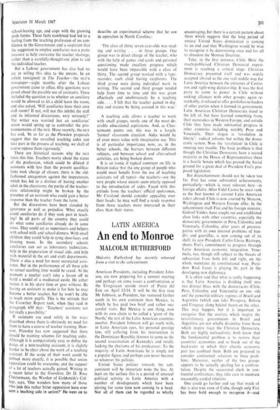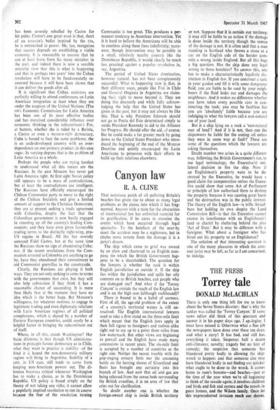An end to Monroe
LATIN AMERICA MALCOLM RUTHERFORD
Malcolm Rutherford has recently returned from a visit to the subcontinent.
American Presidents, including President John- son, are now preparing for a summit meeting and perhaps on some issues a confrontation at the Uruguayan seaside resort of Punta del Este on April 12-14. It will be the first time Mr Johnson, as President, has ventured farther south in his own continent than Mexico, to which he has paid two brief and rather suc- cessful visits. But Mexico is one thing, now with its own claim to be called a 'giant of the North,' the rest of the Latin American countries another. President Johnson will go south with, in Latin American eyes, his personal prestige low, still suffering from his intervention in the Dominican Republic (known to some as the second assassination of Kennedy), and totally lacking the charisma of his predecessor. To the majority of Latin Americans he is simply not a popular figure, and perhaps can never become so whatever his policies.
United States policies towards the sub- continent will be important none the less. At least on the surface this is a period of unusual political activity in Latin America with a number of developments which have been stirring for some time now coming to a head. Not all of them can be regarded as wholly encouraging, but there is a certain pattern about them which suggests that the long period of
uneasy United States domination is coming to an end and that Washington would be wise to recognise it by determining once and for all to abandon the Monroe Doctrine.
Take, in the first instance. Chile. Here the much-publicised Christian Democrat experi- ment is reaching a critical stage. Christian Democracy presented itself and was widely accepted abroad as the one real middle way for Latin America between the extremes of Castro- ism and right-wing dictatorship. It was the first party to come to power in Chile without seeking alliances with other groups; again re- markably, it refused to offer portfolios to leaders of other parties when it formed its government.
Latin American Christian Democrats stand to the left of, but have learned something from, their namesakes in Western Europe, and outside Chile they have made substantial progress in other countries including notably Peru and Venezuela. Their slogan is 'revolution in liberty': radical reforms but within the demo- cratic system. Now the 'revolution' in Chile is running into trouble. The basic problem is that though the Christian Democrats have a record majority in the House of Representatives there is a hostile Senate which has proved the burial ground for a great deal of President Frei's pro- posed legislation.
But disenchantment should not be taken too far. Frei has some substantial achievements, particularly—which is most relevant here—in foreign affairs. After Fidel Castro he must rank as the best known of current Latin American rulers abroad. Chile is now courted by Moscow, Washington and Western Europe alike. In the subcontinent itself Frei and his foreign minister, Gabriel Valdes, have sought out and established close links with other countries, especially the democratic governments in Peru, Colombia and Venezuela. Colombia, after years of preoccu- pation with its own internal problems of ban- dits and guerrillas, is now coming out of its shell; its new President, Carlos Lleras Restrepo, shares Frei's commitment to progress through Latin American economic integration. Vene- zuela, too, though still subject to the threats of subversion from both left and right, on the whole maintains its constitutional way; Presi- dent Raul Leoni is playing his part in the developing new diplomacy.
It is often said that what is really happening is that Latin America is dividing itself into two distinct blocs with the democracies (Chile, Peru, Colombia and Venezuela) on one side and the powerful military regimes of Brazil and Argentina (which can take Paraguay, Bolivia and Uruguay along behind them) on the other. This may happen, but it is important to recognise that the motives which inspire the revolutionary governments in Brazil and Argentina are not wholly dissimilar from those which inspire (say) the Christian Democrats. Both are highly nationalistic; both know that the fundamental problem is to restore their countries' economies and to break out of the backwater to which their chaotic economic past has confined them. Both are prepared to consider continental solutions to these prob- lems. Moreover, neither of the two groups appears to be actually spoiling for a confron- tation. Despite the occasional clash in con- tinental conferences, they take care to maintain reasonably cordial relations.
One could go further and say that much of this is also true even of Cuba, though only Frei has been bold enough to recognise it—and has been severely rebuffed by Castro for his pains. Castro's one great asset is that, short of an assassin's bullet inspired by the cia, he is entrenched in power. He, too, recognises that success depends on establishing a viable economy. It is reasonable to assume that he can at least learn from his many mistakes in the past, and indeed there is now a sensible minority view that this is what is happening and that in perhaps two years' time the Cuban revolution will have to be fundamentally re- assessed because it will have been shown that it can deliver the goods after all.
It is significant that Cuban ministers are perfectly willing to attend conferences on Latin American integration at least when they are under the auspices of the United Nations. (The ant's Economic Commission for Latin America has been one of its most effective bodies and has exercised considerable influence over economic thinking in the subcontinent.) For, at bottom, whether she is ruled by a Batista, a Castro or even a western-styl,! democracy, Cuba is bound to face the same problems; she is an underdeveloped country with an over- dependence on one primary product, in this case sugar. In varying degrees that is the problem of Latin America as a whole.
Perhaps the people who are trying hardest to understand what all this means are the Russians. In the past Moscow has never got Latin America right. At first sight Soviet policy still appears to be a mass of contradictions, but at least the contradictions are intelligent. The Russians have officially encouraged the Chilean Communist party to move to the right of the Chilean Socialists and give a limited amount of support to the Christian Democrats; they are at present seeking a trade agreement with Colombia, despite the fact that the Colombian government is now busily engaged in rounding up all the country's leading Com- munists; and they have even given favourable trading terms to the distinctly right-wing, pro- US regime in Brazil. All this has severely annoyed Fidel Castro, but at the same time the Russians show no sign of abandoning Cuba; nor, if the recent revelations from the Com- munists arrested in Colombia are anything to go by, have they abandoned their commitment to aid Communist guerrillas in the countryside.
Clearly, the Russians are playing it both ways. They are not only seeking to come to terms with the governments that exist, but they will also help subversion if they think it has a reasonable chance of succeeding. It is more than likely that at the moment they have no idea which is the better hope. But Moscow's willingness, for whatever motives, to engage in legitimate trading and even diplomatic relations with Latin American regimes of all political complexions, which is shared by a number of Eastern European countries, could surely be a helpful factor in bringing the subcontinent out of itself.
Where, in all this, stands Washington? Her basic dilemma is that though US administra- tions in principle favour democracy as in Chile, what they want in practice is stability—of the kind it is hoped the non-democratic military regime will bring to Argentina. Stability of a sort, in US eyes, still tends to come from keeping non-American powers out. The di- lemma becomes critical whenever Washington has to make a choice, as in the Dominican Republic. US policy is based simply on the
theory of not taking any risks; it cannot allow a popularly inspired revolution to run its course because the fear of the revolution turning
Communist is too great. This produces a per- manent tendency to American intervention. Yet it is hard to believe the Americans will be able to continue along these lines indefinitely; more- over, though intervention may be possible in a small, relatively nearby country like the Dominican Republic, it would clearly be much less practical against a popular revolution in, say, Argentina.
The period of United States domination, however natural, has not been conspicuously successful. What is happening now is that, in i
their different ways, people like Frei in Chile and General Ongania in Argentina are claim- ing their right to move beyond it. They are doing this discreetly and while fully acknow- ledging the help that the United States has given in the past, but it may not always be like this. That is why President Johnson should not go to Punta del Este determined simply to outdo President Kennedy in aid to the Alliance for Progress. He should offer the aid, of course. But he could make a far greater mark by going down as the United States President who intro- duced the beginning of the end of the Monroe Doctrine and quietly encouraged the Latin Americans to persevere with their efforts to build up their relations elsewhere.































 Previous page
Previous page